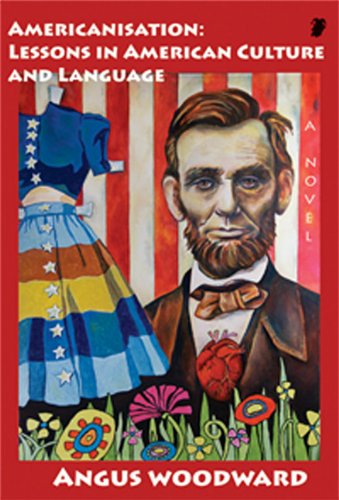Americanisation: Lessons in American Culture and Language

“It has huge strengths: a fascinating and original book concept, great wit, and an author writing with a sense of purpose. . . . the originality and audacity of Mr. Woodward’s vehicle—a novel embedded within a workbook—requires that Americanisation be given the benefit of the doubt. Even with some misfires, this vehicle deserves a test drive.”
Biti Namoeteri has come from South America to the United States to earn a master’s degree in Spiritual Geography—whatever that is. Biti needs help making the transition from simple village life to the materialistic and litigious U.S. Fortunately, he has come prepared with a workbook that will help him learn American language and culture, and the workbook is presciently written for every twist and turn in Biti’s American adventure. This is the set up for Angus Woodward’s unique and clever Americanisation: Lessons in American Culture and Language.
Since the novel is 500 years old, it has been hypothesized that the idiom is exhausted of original ideas. With Americanisation, Mr. Woodward disproves this hypothesis by writing a novel in the form of a workbook for immigrants acclimating to life in the U.S.
Americanisation consists of a series of examples of American conversational English, multiple choice questions, fill-in-the-blank quizzes, etc., on topics likely to confound immigrants. The evolving topics (i.e., airports, apartments, shopping, dating, healthcare, the legal system, the suburban good life, the legal system, redemption) advance the book’s rags-to-riches-to-rags storyline.
Along the way, Mr. Woodward satirizes American commercial institutions—Wal-Mart, Coca Cola, Microsoft, cable TV—but reserves his heaviest fire for attorneys. Lawyers are proctored through trials by Easy Law software and play a video game called Battle Lawyers outside of court. Biti’s workbook offers the following definition of a personal injury lawyer: “Wears suits that are both brand new and quite rumpled. . . . Sighs heavily when impatient.”
Not all of Mr. Woodward’s humor is sharp-edged. For example, apartment complex managers are defined as: “slender young men with messy hair who may appear . . . to be adolescents . . . fond of playing video games.” It’s doubtful that Mr. Woodward has a serious beef with apartment complex managers; rather, he’s playfully sending up the archetypical slacker.
Americanisation has three flaws. First, Biti is too sweet and guileless to be believed. Mr. Woodward uses him as a mirror to reflect the modern-day ugly American, and this comes with a cost. His main character is a modern-day Navin Johnson: a lovable doofus who falls into an undeserved fortune and then loses it. Mr. Woodward could have made Biti less of a sucker. Even if Biti is a complete innocent on his arrival to the U.S., he should be expected to gain some savvy after months of interacting with huckster lawyers and professional personal injury litigants.
Second, while subsuming a novel within a workbook is a delicious idea, it produces a few unsatisfying moments. Some of Mr. Woodward’s vocabulary lists, for example, are long and not particularly clever (though others are).
Third, Mr. Woodward’s depiction of American culture is pervasively negative. While it’s the job of the serious novelist to shine a critical light on who we are, the author has a corresponding responsibility to illustrate our integrity and kindness too. Besides Biti and Janet (his fiancée), the ensemble cast of Americanisation ranges from amoral to immoral.
The central question when deciding whether or not to recommend Americanisation is one of balance. It has huge strengths: a fascinating and original book concept, great wit, and an author writing with a sense of purpose. But as noted above, the book also has flaws. In balance, the originality and audacity of Mr. Woodward’s vehicle—a novel embedded within a workbook—requires that Americanisation be given the benefit of the doubt. Even with some misfires, this vehicle deserves a test drive.